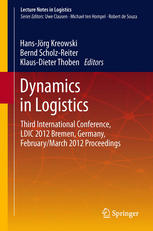

Most ebook files are in PDF format, so you can easily read them using various software such as Foxit Reader or directly on the Google Chrome browser.
Some ebook files are released by publishers in other formats such as .awz, .mobi, .epub, .fb2, etc. You may need to install specific software to read these formats on mobile/PC, such as Calibre.
Please read the tutorial at this link: https://ebookbell.com/faq
We offer FREE conversion to the popular formats you request; however, this may take some time. Therefore, right after payment, please email us, and we will try to provide the service as quickly as possible.
For some exceptional file formats or broken links (if any), please refrain from opening any disputes. Instead, email us first, and we will try to assist within a maximum of 6 hours.
EbookBell Team

4.7
66 reviewsThe volume comprises the proceedings of the third International Conference on Dynamics in Logistics LDIC 2012. The scope of the conference targeted the identification, analysis, and description of the dynamics of logistic processes and networks. The spectrum ranged from the modeling and planning of processes and innovative methods like autonomous control and knowledge management to the new technologies provided by radio frequency identification, mobile communication, and networking. The growing dynamics in the area of logistics poses completely new challenges: Logistic processes and networks must rapidly and flexibly adapt to continuously changing conditions. LDIC 2012 provided a venue for researchers from academia and industry interested in the technical advances in dynamics in logistics. The conference addressed research in logistics from a wide range of fields, e.g. engineering, computer science and operations research.
The volume consists of two invited papers and of 49 contributed papers divided into various subjects including transport logistics, routing in dynamic logistic networks, modeling, simulation, optimization and collaboration in logistics, identification technologies, mathematical modeling in transport and production logistics, information, communication, risk and failure in logistic systems, autonomous control in logistic processes, global supply chains and industrial applications, and the Internet of Things in the context of logistics.